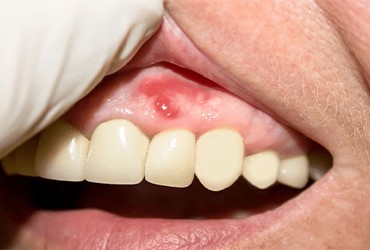An abscess on your gums is typically caused by a bacterial infection.

An abscess on your gums is typically caused by a bacterial infection. It forms when bacteria invade the soft tissues of the gum and surrounding areas, leading to an accumulation of pus. There are 3 main types of gum abscesses:
Gingival Abscess: This type of abscess originates in the gum tissue itself. It's often caused by factors such as poor oral hygiene, gum disease (gingivitis or periodontitis), or trauma to the gum tissue. When bacteria enter small openings or spaces in the gum, they can multiply and lead to an infection. Symptoms of a gingival abscess may include pain, redness, swelling, and sometimes the presence of a pus-filled bump or pimple on the gum.
Periodontal Abscess: A periodontal abscess forms in the deeper supporting structures of the tooth, including the periodontal ligament and bone. It's typically a complication of untreated or poorly managed periodontal disease. In periodontal abscesses, the infection may spread deeper into the tissues, causing severe pain, swelling, and even loosening of teeth.
Abcess due to Untreated Dental Decay, The most common cause of a tooth infection is untreated dental cavities or decay. When bacteria penetrate the hard outer layers of a tooth (enamel and dentin) and reach the pulp, they can multiply and cause an infection and an abscess.
The bacteria most commonly associated with gum abscesses are usually of the anaerobic variety, which means they thrive in areas with limited oxygen. These bacteria can enter the gums through various means, including food particles lodged in gum pockets, dental work that creates openings in the gums, or injuries to the gum tissue.
Treatment for a gum abscess typically involves draining the pus, which can be done through a small incision or root canal therapy in some cases. The dentist will also prescribe antibiotics to help clear the infection. Good oral hygiene practices, such as regular brushing, flossing, and dental check-ups, are essential for preventing gum abscesses.
If you suspect you have a gum abscess or experience any symptoms like severe gum pain, swelling, or pus drainage, it's crucial to seek prompt dental care to prevent the infection from spreading and causing further complications.